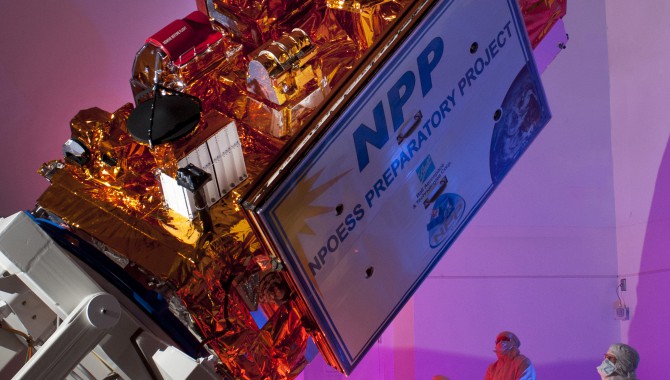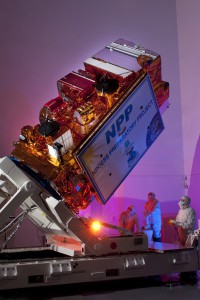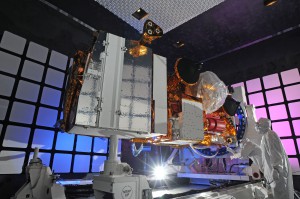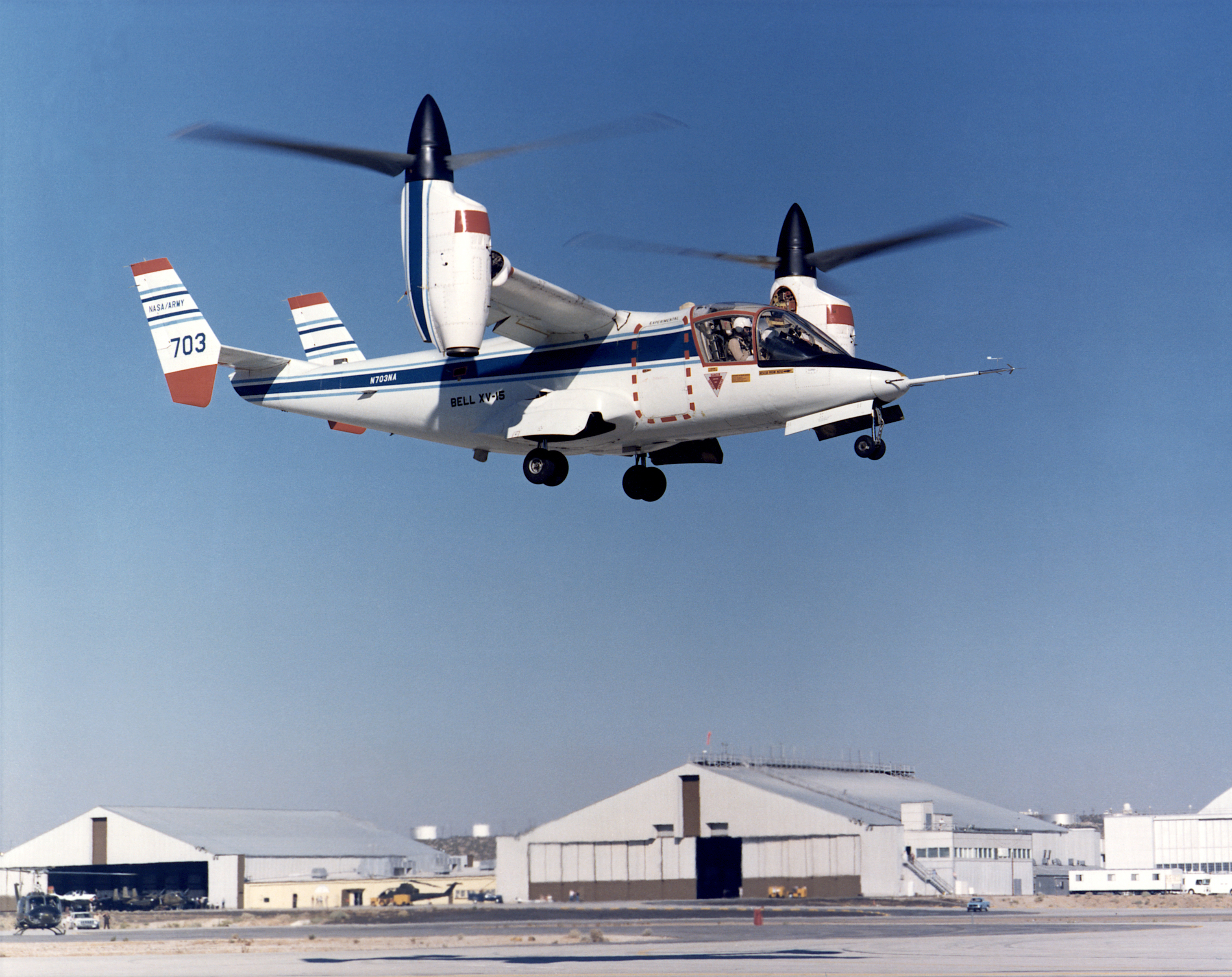
By Barbara Fillip
NASA’s current Spaceflight Program and Project Management Requirements document, NPR 7120.5E, requires projects to develop lessons-learned plans.

The Suomi National Polar-orbiting Partnership (NPP) satellite at the Ball Aerospace facility. The Joint Polar Satellite System will be a near clone of NPP.
Photo Credit: Ball Aerospace
To help projects and programs comply with this new requirement and with NPR 7120.6: Lessons Learned, Goddard’s Office of the Chief Knowledge Officer (OCKO) created a framework that involves embedding existing knowledge management practices—such as Pause and Learn sessions, case studies, and workshops—within project plans. Carrying out these activities during projects—in the moment—helps ensure that memories of events are fresh and the lessons they provide can be put to use immediately. The first and primary beneficiary of any lessons-learned activity should be the project team itself, but these activities also support learning across projects.
The Suomi National Polar-orbiting Partnership (NPP) and Joint Polar Satellite System (JPSS-1) missions are two Goddard projects currently trying to capture important lessons in the moment. JPSS-1 will be carrying the same instruments as Suomi NPP—and will be a near clone of NPP—so it has the potential to learn much from its predecessor satellite.
Capitalizing on an upcoming quarterly meeting of the JPSS-1 project in March 2012, Bryan Fafaul, the project manager for JPSS-1, proposed using the opportunity to engage the Suomi NPP and JPSS-1 teams in a knowledge-sharing exercise. The timing was perfect as Fafaul’s team was moving forward with the JPSS-1 satellite development and the Suomi NPP team had recently completed a successful launch.
Pause and Learn
The foundational element of project learning is Pause and Learn, or PaL, which is a group-reflection activity to ensure that lessons are learned within the project. It is also an open conversation—an opportunity for anyone on the team to articulate insights about the work.
Participants can be a little anxious about how these open-discussion sessions will turn out, so it’s important to have a facilitator who is aware of issues that need to be handled delicately and can deflect inappropriate comments that might derail the conversation. Once the conversation starts, getting participants to contribute their thoughts is never a problem. The key, however, is for a facilitator to guide participants to a productive conversation—one that allows everyone present to add value to the conversation and enhance the group’s understanding of the issues at hand. Creating an open and trusting atmosphere in which team members can communicate freely is essential for capturing lessons learned and sharing knowledge effectively.
If participants walk into a meeting with divergent views of a particular event, they may not come out of a PaL session with a consensus, but they will at least understand that other team members, seeing the same event from another perspective, came up with different interpretations of the event and different conclusions regarding a lesson. When team members are focused on detailed technical lessons, the facilitator’s role can be to connect that detail to a broader lesson or theme, such as proper planning or effective communication.
By conducting PaL sessions systematically after key project milestones, a project ensures it is taking the time during the project to reflect on what has happened—and perhaps even make mid-course adjustments—and is keeping track of insights gained at different stages of the project life cycle. There are multiple benefits to keeping track of insights as they occur. Trying to cover all the lessons of a project’s entire life cycle would likely be unmanageable. Focusing on a reasonably short period of time (a phase, for example) makes more sense. Also, our memories are fallible. A project team’s analysis at the end of a project would most likely neglect or misremember important events and learnings from early phases of the project.
Learning from a Sister Mission
The sessions that gave the Suomi NPP team an opportunity to reflect on what they had learned were a tremendous boon to JPSS-1. “We were very lucky to have had Suomi NPP just complete a successful launch, commissioning, and hand-over to the JPSS program,” Fafaul said. “As such, I really wanted to capture as much of their experience as possible for my team as we move forward with JPSS-1 satellite development. With that said, we leveraged three critical areas: satellite integration and test; the launch campaign; and commissioning for the JPSS flight-project Pause and Learn sessions.”
Fafaul sought the assistance of the OCKO to help plan and implement the sessions. Ed Rogers, Goddard’s chief knowledge officer, facilitated the sessions. To make the PaL sessions manageable, participants were divided between Suomi NPP staff (inner table) and JPSS-1 staff (outer ring). NPP participants were asked to prepare talking points before the session about what went well on their project and what could be improved. The JPSS-1 project management team gathered all the input and shared it with the OCKO team in advance of the PaL. This helped ensure the PaL was tailored to JPSS-1’s knowledge needs and offered opportunities for targeted knowledge-sharing activities.
“JPSS is a unique project in that we are currently building a near clone of Suomi NPP for JPSS-1 that includes the same instrument suite as Suomi NPP, and we are responsible for developing the JPSS-2 satellite,” said Fafaul. “It is critical that we glean as much from the on-orbit performance of the Suomi NPP satellite as possible to ensure we do the right things for JPSS-1 and JPSS-2. Our lessons learned demand us to look back (NPP); look down (JPSS-1); and look forward (JPSS-2) so that we can effectively communicate. And there is no better way to do that than through regular Pause and Learn sessions.”
When discussing the launch campaign, the NPP team noted how the countdown simulations had proven very valuable in preparing for the actual countdown. This was an example of something the JPSS-1 team should try to emulate. In the same conversation about the launch campaign, the NPP team noted that the work environment at the launch site was very different from what the team members were used to, and they weren’t necessarily ready for it. Launch-site activities require very precise execution of a well-thought-out plan. The lesson, in simple terms, was “don’t wait to get there to figure out what needs to be done. Figure out who will be doing what and when ahead of time.” This also implies developing a good understanding of roles and responsibilities during the launch campaign and building relationships with launch-site partners ahead of time. Knowing this, the JPSS-1 team will be more likely to give more attention to preparations for launch activities.
Another issue was contamination, which affected NPP both in the integration and testing phase and at the launch site. The existence of multiple contamination-mitigation plans led to confusion, last-minute changes, and some instances of contamination that could have been avoided. Based on the PaL conversation around this issue, the JPSS-1 team is developing a strong contamination-mitigation plan owned by government contamination control that will leverage specific lessons learned by NPP.
Aggregating Knowledge

Electromagnetic-interference testing of the NPP satellite at the Ball Aerospace facility.
Photo Credit: Ball Aerospace
PaL sessions are just the initial steps of the JPSS-1 lessons-learned plan. Beyond the immediate needs of the JPSS program, relevant lessons will be shared within the Flight Project Directorate’s Knowledge Exchange. The Knowledge Exchange is a knowledge-sharing hub based on SharePoint that now includes a collection of conversation maps, which are a key output of every PaL session. A conversation map is a graphic representation of the conversation that took place during a PaL, highlighting key insights that emerged from the conversation. They serve as a visual reminder of past conversations and are always available to the project team and can be used to identify actions to be taken in the future.
The Knowledge Exchange is not simply a collection of individual project-specific maps. Insights emerging from conversation maps can be aggregated across projects. Looking at multiple conversation maps from multiple projects often reveals patterns that suggest broadly applicable lessons.
Not surprisingly, most PaLs will come across team communication issues. Aggregating insights related to a specific topic (in this case, team communication) in a separate map allows for valuable knowledge to emerge and provides a means for sharing insights across projects. The process generates a knowledge web made up of conversation maps based on project-specific information, and topic maps based on insights aggregated across projects. When a team conducts a second or third PaL, it can use conversation maps created from previous sessions as a starting point. The maps can also facilitate writing official lessons learned at the end of the project to meet NASA requirements. When appropriate, key lessons are submitted for formal inclusion in the agency’s Lessons Learned Information System in compliance with NPR 7120.6.
During the subsequent quarterly meeting of the JPSS-1 project, Fafaul allocated an hour of the agenda to talking about ongoing project-learning activities and Rogers facilitated a short scenario-based discussion focused on organizational silence. Now the JPSS program is adopting the PaL process as well, and conducted its first PaL on September 12, 2012. As more projects adopt the PaL process as the core project-learning activity of their lessons-learned plan, more conversation maps will be generated, enabling the creation of a rich web of knowledge within the Flight Project Directorate’s Knowledge Exchange.
About the Author
 Barbara Fillip is a knowledge management specialist in the Office of the Chief Knowledge Officer at Goddard Space Flight Center. She came to Goddard as a contractor with Library Associates Companies in May 2008 after spending more than ten years working in the field of international development, occupying functions encompassing program and project evaluation, information and communication technologies for knowledge sharing, as well as capacity building and training. Barbara Fillip is a knowledge management specialist in the Office of the Chief Knowledge Officer at Goddard Space Flight Center. She came to Goddard as a contractor with Library Associates Companies in May 2008 after spending more than ten years working in the field of international development, occupying functions encompassing program and project evaluation, information and communication technologies for knowledge sharing, as well as capacity building and training. |









